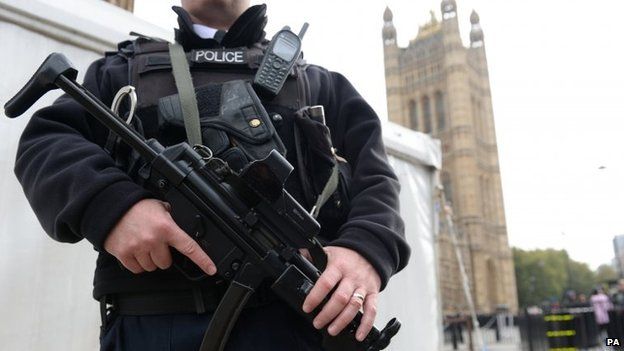Theresa May to publish new anti-terror powers
- Published
- comments

New measures to tackle terrorism are to be unveiled by the home secretary, days after she said the UK faces a "greater" terror threat than ever before.
Theresa May is to publish a new counter-terrorism bill, which includes a requirement for schools, universities and councils to counter radicalisation.
But plans to stop some UK fighters returning have been questioned by the independent reviewer of terror laws.
Campaigners have also warned the bill threatens civil liberties.
It comes as a week-long counter-terrorism awareness campaign enters its third day.
'Deadly ideology'
The UK's terror threat level remains "severe" after it was upped from "substantial" earlier this year in response to conflicts in Iraq and Syria.
Forty terror plots have been foiled in the UK since the 7 July bombings in London in 2005.
Speaking ahead of the bill's publication, David Anderson QC, the independent reviewer of terror laws, told parliament the proposal to stop British fighters returning from Syria and Iraq was an "announcement awaiting a policy".
The new Counter-Terrorism and Security Bill includes:
- Counter-radicalisation measures - requirements that schools, colleges and probation providers help prevent people being radicalised
- Changes to TPIMs - Terrorism Prevention and Investigation Measures - to allow the authorities to force suspects to move to another part of the country
- Raising the burden of proof for imposing TPIMs from "reasonable belief" to "balance of probabilities"
- Greater powers to stop people heading abroad to fight - including cancelling passports at the border for up to 30 days
- Statutory temporary exclusion orders to control return to the UK of British citizens suspected of terrorist activity
- Tighter aviation security - requiring airlines to provide passenger data more quickly and effectively
- A ban on insurance companies from covering ransoms
- Forcing firms to hand details to police identifying who was using a computer or mobile phone at a given time
Speaking ahead of the bill's publication, Mrs May said: "We are in the middle of a generational struggle against a deadly terrorist ideology. These powers are essential to keep up with the very serious and rapidly changing threats we face.
"In an open and free society, we can never entirely eliminate the threat from terrorism.
"But we must do everything possible in line with our shared values to reduce the risks posed by our enemies.
"This bill includes a considered, targeted set of proposals that will help to keep us safe at a time of very significant danger by ensuring we have the powers we need to defend ourselves."
Theresa May: "We are engaged in a struggle that will go on for many years"
But Shami Chakrabarti, director of human rights group Liberty, said: "Yet again, politicians resort to high talk and rushed legislation in an attempt to look tough in the face of terrorism. Another chilling recipe for injustice and resentment by closing down the open society you seek to promote."
Amnesty International called the powers "draconian", adding none of the measures seemed "properly thought through".
But Mrs May has warned that even the new powers will not fully address the threat, reiterating the need for the Communications Data Bill of more wide-ranging web monitoring powers to be enacted.
That bill - labelled a snooper's charter by critics - was scrapped following Lib Dem opposition.
'Changing behaviour'
On Tuesday a report into the killing of Fusilier Lee Rigby concluded the security agencies could not have prevented his death.
There were errors in the security operation but they were not "significant enough to have made a difference", the Intelligence and Security Committee report said.
Fusilier Rigby was killed on 22 May last year, near Woolwich Barracks in London, at the hands of Michael Adebolajo and Michael Adebowale.
David Cameron said internet companies had a "social responsibility" to act on terrorist material posted online after the report detailed how Adebowale spoke on Facebook about wanting to murder a soldier.
The social networking site said it did not allow terrorist content and takes steps to prevent it.
The report also said the government's Prevent programme, designed to divert individuals from radicalisation, had not been given sufficient priority.
The national policing lead for the programme, Chief Constable Sir Peter Fahy, said: "The police cannot be in every mosque, college or other community venue monitoring what is discussed and the doctrines which are promoted. Nor would we want Britain to be such a society.
"We need parents, schools, partners, friends and colleagues to be aware of the signs that someone is being influenced by extremist messages and have the confidence to report any concerns to the police."
This week's national campaign will see more than 6,000 people receive briefings at 80 venues across the country.
- Published25 November 2014
- Published25 November 2014
- Published24 November 2014
- Published23 November 2014